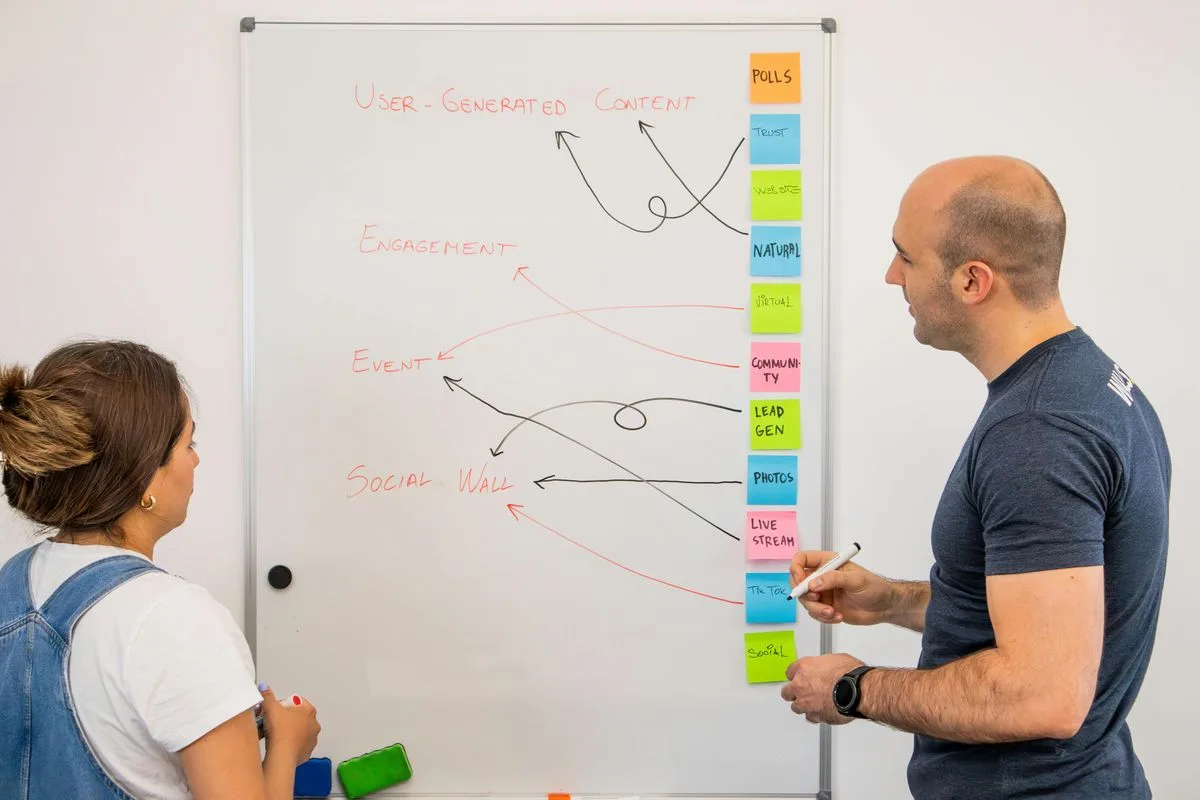Growleady Team
Lead Generation Experts
Top 10 B2B Skills: Mastering Business-to-Business Success
Unlock essential B2B skills, from relationship management to digital marketing strategies. Master the art of closing deals and driving growth.

Ever wondered what sets successful B2B professionals apart? It's all about those essential B2B skills! In today's rapid business world, mastering the art of business-to-business interactions can make or break your career.
Whether you're a seasoned pro or just starting out, understanding B2B skills is crucial. These aren't your everyday business skills – they're the secret sauce that helps you navigate the complex world of inter-company relationships. From negotiation tactics to relationship building, B2B skills cover a wide range of abilities that'll help you thrive in the corporate jungle.
Understanding B2B Skills

B2B skills are crucial for professionals working in industries where companies sell products or services to other businesses. These skills encompass a range of technical, soft, and leadership abilities that help B2B marketers, salespeople, and business development managers excel in their roles.
Defining B2B in the Business World
B2B, or Business-to-Business, refers to commercial transactions between businesses. It's the process of one company selling goods or services to another. Unlike B2C (Business-to-Consumer) transactions, B2B deals often involve:
Larger order volumes
Extended sales cycles
More complex decision-making processes
Multiple stakeholders in the purchasing decision
For example, a software company selling enterprise solutions to other businesses is engaged in B2B transactions. These deals typically require in-depth knowledge of the client's industry, customized solutions, and ongoing support.
Target Audience: B2B targets other businesses, while B2C targets individual consumers.
Decision-Making Process: B2B decisions often involve multiple stakeholders and longer deliberation periods. B2C decisions are usually made by individuals or small family units.
Relationship Building: B2B focuses on long-term partnerships and ongoing support. B2C interactions are often transactional and short-term.
Marketing Approach: B2B marketing emphasizes logic, ROI, and business benefits. B2C marketing appeals to emotions and personal desires.
Sales Cycle: B2B sales cycles can last months or even years. B2C sales cycles are typically much shorter, sometimes instantaneous.
Product Complexity: B2B products or services are often more complex and customizable. B2C offerings are usually standardized and ready for immediate use.
Pricing: B2B pricing is often negotiable and can involve complex contracts. B2C pricing is typically fixed and straightforward.
Volume: B2B transactions often involve bulk orders or long-term service agreements. B2C purchases are usually smaller in volume and value.
Understanding these differences is crucial for developing effective B2B skills. For instance, when crafting a cold email for a B2B prospect, you'll need to focus on business value and ROI rather than personal benefits. Similarly, LinkedIn outreach for B2B leads should emphasize professional networking and industry expertise rather than consumer-focused messaging.
By recognizing these distinctions, you'll be better equipped to tailor your approach and develop the specific skills needed for success in the B2B world.
Essential B2B Communication Skills
B2B communication skills are the cornerstone of successful business-to-business interactions. These skills enable sales professionals to effectively convey value, build relationships, and close deals in complex B2B environments.
Active Listening and Empathy
Active listening is a crucial skill in B2B communication. It involves fully concentrating on what your business clients are saying, understanding their needs, and responding thoughtfully. Here's how to practice active listening:
Give your full attention: Put away distractions and focus on the speaker.
Show you're listening: Use non-verbal cues like nodding and maintaining eye contact.
Provide feedback: Summarize what you've heard to confirm understanding.
Defer judgment: Avoid interrupting or jumping to conclusions.
Respond appropriately: Ask relevant questions and provide insightful comments.
Empathy goes hand-in-hand with active listening. It's about putting yourself in your client's shoes and understanding their perspective. To cultivate empathy:
Ask open-ended questions to gain deeper insights into their challenges.
Acknowledge their feelings and concerns.
Share relevant experiences to show you understand their situation.
Tailor your solutions to address their specific pain points.
Persuasive Presentation Abilities
Persuasive presentation skills are essential for B2B sales success. They help you effectively communicate your product or service's value proposition. To enhance your persuasive abilities:
Know your audience: Research your prospects thoroughly to understand their needs, pain points, and decision-making processes.
Structure your presentation logically: Start with a compelling hook, present your key points clearly, and end with a strong call-to-action.
Use storytelling: Incorporate case studies and success stories to illustrate how your solution has helped similar businesses.
Leverage data and visuals: Use charts, graphs, and relevant statistics to support your arguments and make complex information easy to understand.
Practice active engagement: Encourage questions and interactions throughout your presentation to keep your audience engaged.
Master objection handling: Anticipate potential objections and prepare compelling responses in advance.
Develop a confident delivery: Work on your body language, tone of voice, and pacing to project confidence and credibility.
Remember, persuasive presentations in B2B settings often involve multiple stakeholders. Tailor your message to address the concerns of different decision-makers, from C-level executives to end-users.
By honing these essential B2B communication skills, you'll be better equipped to build strong relationships, navigate complex sales cycles, and eventually close more deals in the B2B world.
Technical Expertise in B2B Environments

Technical expertise is crucial for success in B2B environments. You'll need to master specific skills to excel in this complex world.
Industry-Specific Knowledge
In B2B, understanding your industry inside and out is non-negotiable. You're not just selling products; you're providing solutions to complex business problems. Here's how to build your industry knowledge:
Stay updated on industry trends: Subscribe to trade publications, attend conferences, and follow industry leaders on social media.
Learn your customers' businesses: Understand their pain points, processes, and goals. This knowledge helps you tailor your approach and offer more valuable solutions.
Master your product ecosystem: Know your products and your competitors' offerings. This expertise allows you to effectively differentiate your solutions.
Develop a broad business acumen: Familiarize yourself with finance, operations, and strategy concepts. This broader understanding helps you speak the language of decision-makers across various departments.
Data Analysis and Interpretation
In today's data-driven B2B world, the ability to analyze and interpret data is invaluable. Here's how to sharpen your data skills:
Learn basic statistics: Understand concepts like mean, median, standard deviation, and correlation. These fundamentals form the basis of data interpretation.
Master data visualization tools: Programs like Tableau or Power BI help you present data in compelling, easy-to-understand formats.
Develop predictive analysis skills: Learn to use historical data to forecast future trends. This skill is crucial for strategic decision-making in B2B environments.
Practice data-driven storytelling: It's not enough to crunch numbers; you need to communicate insights effectively. Learn to weave data into compelling narratives that drive action.
Understand AI and machine learning basics: These technologies are increasingly important in B2B. Familiarize yourself with how they can be applied to your industry.
Remember, in B2B, you're often dealing with larger datasets and more complex analyses than in B2C. Your ability to extract meaningful insights from this data can set you apart from competitors and provide significant value to your clients.
By honing these technical skills, you'll position yourself as a valuable asset in the B2B world. Whether you're in sales, marketing, or business development, this expertise will help you navigate complex business relationships, identify opportunities, and drive growth for your organization.
Relationship Management in B2B
Relationship management is the cornerstone of successful B2B sales. It's about cultivating strong, long-lasting connections with clients that go beyond mere transactions. Let's explore the key aspects of effective relationship management in the B2B world.
Building Long-Term Partnerships
Building long-term partnerships is crucial for sustainable success in B2B sales. Here's how you can foster these relationships:
Understand your client's business: Dive deep into your client's industry, challenges, and goals. This knowledge allows you to offer tailored solutions that truly address their needs.
Consistent communication: Regular check-ins, updates, and feedback sessions keep the lines of communication open. Use a mix of phone calls, emails, and face-to-face meetings to stay connected.
Deliver value beyond the sale: Share industry insights, market trends, or relevant research with your clients. This positions you as a trusted advisor rather than just a vendor.
Be reliable and responsive: Always follow through on your commitments and respond promptly to client inquiries. Reliability builds trust and strengthens the partnership.
Celebrate shared successes: Acknowledge milestones and achievements in your partnership. This reinforces the value of your collaboration and strengthens the bond.
Exploring Complex Stakeholder Networks
B2B sales often involve multiple decision-makers and influencers. Here's how to navigate these complex networks effectively:
Map the stakeholder world: Identify all key players involved in the decision-making process. Understand their roles, interests, and level of influence.
Tailor your approach: Customize your communication and value proposition for each stakeholder. What matters to the CFO might differ from what concerns the IT manager.
Build alliances: Identify and nurture relationships with internal champions who can advocate for your solution within their organization.
Manage conflicting interests: Be prepared to address concerns and objections from different stakeholders. Find common ground and highlight how your solution benefits various departments.
Stay patient and persistent: Complex stakeholder networks often lead to longer sales cycles. Maintain regular touchpoints and be prepared to adapt your strategy as the situation evolves.
Leverage social selling: Use LinkedIn and other professional networks to connect with and engage stakeholders. Share valuable content and insights to establish credibility.
By mastering these relationship management skills, you'll be better equipped to build lasting partnerships and navigate the intricate world of B2B sales. Remember, in B2B, success isn't just about closing deals—it's about cultivating relationships that drive mutual growth and success over the long term.
Strategic Thinking and Problem-Solving
Strategic thinking and problem-solving are crucial B2B skills that set top performers apart. These abilities enable professionals to navigate complex business landscapes and deliver innovative solutions to their clients.
Identifying Business Opportunities
In B2B sales, identifying business opportunities is a vital skill that requires a keen eye for market trends and client needs. You'll need to:
Analyze market data to spot emerging trends
Conduct thorough research on potential clients' industries
Listen actively during client conversations to uncover pain points
Stay updated on industry news and developments
Network strategically to discover untapped markets
For instance, GrowLeady exemplifies how strategic thinking translates into identifying and capitalizing on market trends. By understanding shifts such as the increasing demand for advanced B2B solutions, GrowLeady tailors its offerings to address evolving client needs and industry trends, such as remote work solutions. This proactive approach helps them not only meet current demands but also anticipate future opportunities.
A common mistake is focusing solely on immediate sales opportunities. Instead, think long-term and look for ways to add value to your clients' businesses beyond your current offerings. This approach helps build lasting partnerships and opens doors to future opportunities.
Developing Customized Solutions
Once you've identified opportunities, the next step is developing customized solutions that address your clients' specific needs. Here's how to excel in this area:
Dive deep into client operations: Understand their processes, challenges, and goals.
Collaborate with internal teams: Work with product development, engineering, and customer success to create tailored offerings.
Think outside the box: Don't be afraid to propose innovative solutions that combine different products or services.
Present solutions clearly: Use data, case studies, and visual aids to demonstrate the value of your customized approach.
Be flexible: Be prepared to adjust your solution based on client feedback and changing requirements.
For instance, if you're selling marketing services, don't just offer a one-size-fits-all package. Instead, create a customized marketing strategy that aligns with your client's unique brand voice, target audience, and business goals.
A common pitfall is over-promising and under-delivering. Always ensure that your proposed solutions are realistic and achievable within your organization's capabilities. It's better to exceed expectations than to fall short of ambitious promises.
To improve your strategic thinking and problem-solving skills, consider:
Regularly brainstorming with colleagues from different departments
Attending industry conferences to gain fresh perspectives
Practicing scenario planning to prepare for various business challenges
Seeking mentorship from experienced B2B professionals
Investing in continuous learning through courses and workshops focused on strategic thinking
By honing these skills, you'll position yourself as a valuable asset to both your organization and your clients, driving success in the competitive B2B world.
Negotiation and Sales Skills for B2B Professionals
Mastering negotiation and sales skills is crucial for B2B professionals to excel in their roles. These abilities form the foundation of successful business relationships and drive revenue growth.
Understanding Value Propositions
Understanding and articulating value propositions is a cornerstone of B2B sales success. You'll need to clearly communicate how your products or services meet your clients' needs and provide a competitive advantage. Here's how to sharpen this skill:
Research your client's industry: Dive deep into their market, challenges, and goals.
Tailor your message: Customize your value proposition to address specific pain points.
Quantify benefits: Use data and metrics to demonstrate tangible value.
Practice active listening: Pay attention to what clients say about their needs and priorities.
Use storytelling: Illustrate your value proposition with relevant case studies or success stories.
Remember, a compelling value proposition isn't just about features; it's about outcomes. Focus on how your offering solves problems or creates opportunities for your clients.
Closing High-Stakes Deals
Closing high-stakes deals in the B2B world requires a blend of strategy, persistence, and interpersonal skills. Here's how to improve your deal-closing abilities:
Build trust early: Establish credibility and rapport from the first interaction.
Understand the decision-making process: Identify key stakeholders and their roles.
Address objections proactively: Anticipate concerns and prepare thoughtful responses.
Create a sense of urgency: Highlight time-sensitive benefits or limited-time offers.
Use social proof: Share testimonials or case studies from similar clients.
Negotiate win-win outcomes: Find mutually beneficial solutions rather than pushing for one-sided wins.
Follow up strategically: Develop a follow-up plan that adds value at each touchpoint.
When closing high-stakes deals, timing is critical. Be patient and persistent, but also know when to push for a decision. Remember, the goal isn't just to close the deal but to lay the groundwork for a long-term partnership.
Common mistakes in B2B negotiations include:
Focusing too much on price instead of value
Neglecting to involve all key decision-makers
Failing to align your solution with the client's long-term strategy
Overlooking the importance of building personal relationships
To avoid these pitfalls, invest time in understanding your client's business holistically. This approach will help you position your offering as an integral part of their success strategy rather than just another product or service.
Different negotiation techniques may be appropriate depending on the situation:
Collaborative negotiation: Best for long-term partnerships where both parties seek mutual benefits.
Competitive negotiation: Useful when resources are limited and stakes are high.
Compromise-based negotiation: Effective when time is short and a middle-ground solution is acceptable.
Incorporate these practices by role-playing different scenarios with colleagues, analyzing past successful deals, and continuously refining your approach based on feedback and results.
To improve your B2B negotiation and sales skills:
Attend industry-specific negotiation workshops
Seek mentorship from experienced B2B sales professionals
Practice active listening in all your interactions
Stay updated on your clients' industries and market trends
Develop your emotional intelligence to better navigate complex interpersonal dynamics
By honing these skills, you'll be better equipped to navigate the complexities of B2B sales, close high-stakes deals, and build lasting business relationships.
Adapting to the Digital B2B Landscape
The B2B world is rapidly evolving, and digital transformation is at the forefront of this change. To succeed in modern B2B sales, you must adapt to new digital tools and strategies that enhance your ability to connect with clients and close deals.
Leveraging Digital Marketing Platforms
Digital marketing platforms are essential tools in your B2B sales arsenal. They help you reach a wider audience, generate leads, and nurture relationships with potential clients. Here's how to make the most of these platforms:
Social media marketing: LinkedIn is your go-to platform for B2B networking. Create a strong professional profile, share industry insights, and engage with potential clients' content. Post regular updates about your products or services, and use LinkedIn's advanced search features to find decision-makers in your target companies.
Content marketing: Develop valuable, informative content that addresses your clients' pain points. This includes blog posts, whitepapers, case studies, and webinars. Share this content across various digital channels to establish your expertise and attract potential leads.
Email marketing: Use personalized email campaigns to nurture leads and keep your brand top-of-mind. Segment your email list based on industry, job title, or stage in the sales funnel to deliver targeted content that resonates with each group.
Search engine optimization (SEO): Optimize your website and content for relevant keywords to improve your visibility in search results. Focus on long-tail keywords that reflect specific B2B queries to attract qualified leads.
Pay-per-click (PPC) advertising: Use targeted ads on platforms like Google Ads and LinkedIn to reach decision-makers in your target industries. Create landing pages specific to each campaign to maximize conversions.
Remember, the key to successful digital marketing in B2B is providing value at every touchpoint. Don't just sell; educate, inform, and solve problems for your potential clients.
Embracing E-commerce in B2B Transactions
E-commerce is no longer limited to B2C transactions. B2B buyers increasingly expect the same convenience and user experience they enjoy as consumers. Here's how to effectively incorporate e-commerce into your B2B sales strategy:
User-friendly online platforms: Develop an intuitive, easy-to-navigate e-commerce platform that caters to B2B buyers' specific needs. Include features like bulk ordering, customizable pricing based on volume, and easy reordering of previous purchases.
Personalized pricing and accounts: Offer personalized pricing and account management features that reflect individual client relationships and negotiated terms. This might include custom catalogs, contract-specific pricing, and approval workflows for large orders.
Detailed product information: Provide comprehensive product details, technical specifications, and high-quality images or videos. B2B buyers often need more in-depth information than B2C customers to make informed decisions.
Integration with procurement systems: Ensure your e-commerce platform can integrate with your clients' procurement systems (e.g., SAP, Oracle) to streamline the purchasing process and reduce friction in transactions.
Self-service options: Carry out self-service features that allow clients to track orders, manage their accounts, and access support resources without always needing to contact a sales representative.
Mobile optimization: Make sure your e-commerce platform is mobile-responsive. Many B2B buyers research products and make purchasing decisions on-the-go.
Data analytics: Use e-commerce data to gain insights into customer behavior, popular products, and buying patterns. This information can help you refine your sales strategy and improve your offerings.
By embracing these digital strategies, you'll position yourself as a forward-thinking partner who can meet the evolving needs of B2B clients. Remember, the goal is to make the purchasing process as smooth and efficient as possible for your clients while providing the personalized service that B2B relationships require.
Conclusion
Mastering B2B skills is essential for success in today's complex business world. From relationship management to negotiation techniques and digital marketing prowess these abilities can make or break your B2B career. By honing your technical soft and leadership skills you'll be better equipped to navigate stakeholder networks close high-stakes deals and foster long-term partnerships. Remember to continuously adapt to the evolving digital B2B environment and leverage e-commerce platforms to meet client needs. With dedication and practice you can develop the expertise needed to thrive in the competitive world of B2B transactions.
Frequently Asked Questions
What are the key differences between B2B and B2C transactions?
B2B transactions typically involve larger order volumes, longer sales cycles, and more complex decision-making processes compared to B2C. They often require relationship building, technical knowledge, and understanding of business operations. B2B deals are usually based on long-term partnerships and involve multiple stakeholders, while B2C transactions are more immediate and emotion-driven.
How can I improve my negotiation skills for B2B deals?
Enhance your negotiation skills by attending workshops, seeking mentorship, and practicing active listening. Develop industry knowledge to understand client needs better. Work on your emotional intelligence to read and respond to others effectively. Practice different negotiation techniques and learn from both successful and unsuccessful deals. Remember to focus on creating win-win outcomes for long-term partnerships.
What are common negotiation mistakes to avoid in B2B?
Common B2B negotiation mistakes include focusing solely on price, neglecting to build relationships, failing to understand the client's needs, and not preparing adequately. Avoid being inflexible, making assumptions, or ignoring cultural differences. Don't rush the process or neglect post-negotiation follow-ups. Remember that B2B negotiations are about creating long-term value, not just closing a single deal.
How important is digital marketing in B2B?
Digital marketing is crucial in B2B. It helps reach and engage potential clients through platforms like social media, content marketing, and email campaigns. SEO and PPC advertising increase visibility to decision-makers. Digital marketing allows for targeted messaging, lead generation, and nurturing relationships throughout the lengthy B2B sales cycle. It's essential for staying competitive and adapting to changing buyer behaviors in the digital age.
What role does e-commerce play in B2B transactions?
E-commerce is increasingly important in B2B, offering convenience and efficiency. It involves creating user-friendly online platforms with personalized pricing, detailed product information, and integration with procurement systems. E-commerce in B2B should provide self-service options, mobile optimization, and leverage data analytics for personalized experiences. It streamlines purchasing processes, reduces operational costs, and meets the evolving expectations of B2B buyers accustomed to B2C online experiences.
How can I build and maintain strong B2B relationships?
Build strong B2B relationships by focusing on trust, communication, and mutual benefit. Consistently deliver value and meet commitments. Understand your client's business goals and challenges. Provide personalized solutions and exceptional service. Stay in regular contact, not just during sales cycles. Offer insights and industry knowledge. Be responsive to their needs and proactive in addressing issues. Remember, strong B2B relationships are built on long-term partnerships, not just transactions.


